|
Time. Sometimes the tiny grains of the hourglass land like bombs. My feet feel guided by time, sometimes I’m a slave to it, my busyness distorts its rhythm, and my denial pretends like it’s not there. When I talk to mom (95-years-old) she often says, “Oh, it’s been such a long, long, day.” Her voice is weary, like someone who has been counting grains of sand. It breaks my heart because she doesn’t want more, and I’d like to turn the hourglass over. She’s had too much and I want more. Of course, this time conundrum is universal, but it feels personal. We who want to believe in the Goldilocks’ fairytale, are always frustrated because time almost never feels just right. Recently, mom looked into a mirror and said, “Ick, who is that old lady?” Her contempt surprised me. She followed up with the Bette Davis quote “Old age is no place for sissies.” I assume Bette and mom meant the weak and soft. Personally, I think sissies might teach us a thing or two because this is one battle none of us is going to win, no matter how fast we run and how big our muscles. Yet, when I look in the mirror, I’m not far behind you, mom. Unless the lighting is soft and kind, I prefer not to look too closely. The man in the mirror has more sags and wrinkles, and a drunken farmer must have thought it would be fun to plant the late crop of hair follicles in unlikely places. Bodies are timekeepers, truth tellers, even if we don’t want to hear it. Yet, we resist. When did it become so terrible that we don't even want to look? Ross Gay, poet and essayist, in his book, The Book of Delights, reflects on Donny Hathaway’s, “For All We Know.” If you haven’t heard it in a while, take a listen. It will do things to your heart. Gay suggests that Donny is not singing about romance with “happy endings,” he’s singing about our disappearance. “His is a voice that makes you realize that your voice is the song of your disapearing, which is to say our most common song. The knowledge of which, the understanding of which, the inhabiting of which, might be the beginning of a radical love. A renovating love, even.” The essence of our fear, that those we love are slipping through the hourglass and we are not far behind, is also the essence of love. Our vulnerability and impermanence are the poignant pigment of our most elevated art. The willingness to give ourselves over to that which will not last is at the very heart of our transcendence, which is to say love. Simone Campbell, Catholic nun and organizer of the cross-country justice tour, Nuns on The Bus, sees our broken hearts as potential for breaking open—making room for more which is crazy talk, maybe even radical.
I recently met my friend, Jessica's, amazing seven-year-old son, Quentin (he told his mom that I should use his name). Quentin has had multiple serious medical issues in his young life and if life wasn’t complicated enough, he’s on the autism spectrum. He’s a beautiful child who is negotiating his way through the difficulties and complexities of a social world. He is curious and, in many ways, seems wise beyond his years. After we met and had dinner, he told Jessica that he wanted to see me again. He said, “I think I really like him, no, maybe even love him.” He said I made him smile and I listened to him. He said, “It made me feel happy all over, isn’t that love?” I had no words, just eyes misty with awe. What a teacher, this child, a heart that is still available to being broken open. I can only aspire to be as brave. Sometimes what frightens me, is an invitation for my attention. Perhaps not the “throw open the windows and doors” kind of attention, but rather the curious and self-compassionate kind of attention that says, I see you and I will stay. I will hold your hand as the grains of sand land and my hearts beats.
2 Comments
The day is over. When did it begin? I had one of those days last week, dreamlike, not an interesting or sweet dream, but one that feels foggy, where limbs and mind have lost their agency. At the end of the day, I had no idea how I had gotten from breakfast to bedtime. I was busy . . . with something, but the to-do list had no cross-outs. There were really important things on the list, things I wanted to do and should have done. Remarkably, I wasn’t aware of actively resisting or avoiding. Usually the to-do list looks at me with beady eyes and calls me four-lettered words. But this day it was silent. As I got ready for bed, I had a dull sense that I was waking up, but it was bedtime, so yup, I went to bed. In the morning, I did my morning writing which is to say I did my dance with the devil of regret. My pen whined with yesterday’s reproach. I had wasted the day. I was a lollygagger. Don’t you love the way that word bounces and rolls around in your mouth? My dad used to use it to describe our summer sweaty lethargy when weeding long rows of peas or beans. In retrospect his word choice was a bit surprising—back in the day lollygag meant “fooling around,” the naughty kind. I could use a lollygag, without the weeds, but I digress. Why did I waste the day? The sloppy ink marks on the paper tried to figure out what went wrong, what was wrong with me.
I just wanted to be somewhere else. Maybe I should move to Wisconsin. Maybe I should join a monastery? Maybe I should make pancakes instead of savory oatmeal for breakfast—blood sugar be damned. Please, just anywhere but here. Fingers stiff from my vice grip hold, I finally reached the end of my allotted three pages of college-ruled paper and put my pen down. Feeling no relief, I did my morning meditation. The singing bell sent me on my way, one breath, another one, another one, even my breathing wasn't right. Exhausted, I finally allowed my exhale to be surrender. In that strange place of letting go or letting be, I noticed how my flesh was clenching. It started in my belly and radiated to my jaw and landed in my shoulders. Constricted. Ouch. What if I softened one of these body parts, maybe just around the edges, maybe just for a moment? Could it be so simple and so difficult? It began with just a wish. But with more room, a loving phrase came bouncing through my door in a language I understood. From the land of dreams or ancestors or the divine, suddenly a voice, “Honey, I’m home.” l burst open like an untamed person, belly laughs, snot, snorts and tears, amazed I could do all of them at the same time, amazed by my body’s reaction to this hilarious, soulful and sweet greeting. In the midst of lollygag disgust and the wish that Spock would beam me anywhere but here, I landed in the dusty dirt. Amazed that space brought presence and kindness found me home. Honey I’m Home
Outside the sun sparkles. Inside, a shadow that shouldn’t be, Moves on legs that don’t belong. Neither awake, nor asleep. “What’s wrong with me?” “This shouldn’t be.” I fall before the altar of no, Prostrate, forgetting to breathe. Small, alone with clenched gut, The ugly mean man, With small sharp words, Appears without invitation. Bangs his fist. “You disgust me” Unleashes the second arrow, And pierces my softest flesh. Bloodless and invisible. Shame without a name. Shuffling slippers in circles, On their way to where they began. Yet the sun still shines. And sealed eyes need only to turn, To feel the warmth of light. Even a sliver will do. Breath remembers to breathe, Unclenched, my body finds room, And room and room and room. Space for all to belong, even him. The ground shakes. Sun and rain are one. Baptized by tears and love, Honey, I’m home. David Fredrickson August 2019 I pause before I make the call. I’m determined to give her all my attention. The last time I called I tried to make dinner while we talked—the dinner was a flop and I could tell that mom felt neglected. “Hi mom.” My voice hits notes that are meant to be bright and breezy. “Oh hi, David.” Mom tries to match my lightness but underneath is something heavy. I take a deep breath. “What did you do today?” “Just a minute, let me find the calendar.” The nursing home calendar helps her know what day it is but also reminds her what she did. “Today’s Friday isn’t it? I guess we had happy hour today.” Every Friday the nursing home has a happy hour for the residents and their families that includes live music, snacks, and Dixie cups of beer, wine or soda. “How was it?” “I guess it was OK.” She takes a deep breath. “It’s been such a long day.” It’s her way of saying she’s lonely and sad. She doesn’t name dad’s death but it's the ground she stands on. I’m grateful she tells it like she feels it. That hasn’t always been the case—preacher’s wives are expected to be sunny even when they’re not. Yet, her assessment of the day makes my heart sink. Mom has many reasons to feel depressed but her form of dementia—short-term memory loss, exacerbates her pain. She doesn’t have access to recent positive memories that might mitigate her distress. She is unable to create a timeline that is balanced with the good and the not so good. “The walls are closing in on me. I feel like I can hardly breathe.” She is the moment and in this moment her aloneness feels absolutely devastating. “I’m so sorry mom. You not only lost your husband but you lost your best friend.” “How long has he been gone?” Mom asks like she’s asking for the first time. “Almost two years.” “Really, it seems like a lifetime ago.” “I know. And you have a lifetime, sixty-six years, of memories. Remember how dad used to like watching people at happy hour?” She chuckles, “He‘d never been to a happy hour in his life before moving in here.” I can feel her smile over the phone. “I think he found it entertaining.” I was raised in a teetotaling home. Dad preached abstinence to his church and his family so it was amazing that happy hour became a fascination. “Remember when he took a sip of wine by mistake and spat it out?” I ask. She laughs again. “That reminds me of the Tic Tac story. Dad used to fall asleep during prayer meeting so I'd give him Tic Tacs to keep him awake. You know it wasn't good if the preacher fell asleep. Well, it was summer and a lady bug landed on my lap and I wanted dad to get rid of it so I put it in his hand. His eyes were closed and he thought it was a Tic Tac. He didn't spit it out. I laughed so hard that the pew shook.” We both laugh. The Tic Tac story is part of our family lore that gets remembered and repeated almost every time we are together. “I bet dad would have had fun at your squirt gun fight yesterday.” “Did we have a squirt gun fight?” “Yes, I saw it on the nursing home’s Facebook page. You looked like you were having fun.” “Oh that’s right.” She chuckles again. It’s a fine balance between honoring the pain she is in and helping her build a scaffold of memories that remind her that pain doesn’t define her. She is remarkably willing to go where I lead as long as I am in it with her and leading with my heart.
* * * * * “Welcome everyone. I’d like to introduce David Fredrickson. He’s going to be talking to us about mindful self-compassion.” The director of Memory Care Life smiles sweetly at me. It’s a support group for people with dementia and their caregivers. I cross my legs and smile but inside my stomach tightens. The people sitting in the circle are in varying stages of dementia and their caregivers appear good hearted but in varying stages of angst and worry. How can I possibly say anything that will be meaningful or helpful to everyone in the room? My internalized teenage boy with his imposter complex clicks his tongue and shakes his head. Who do you think you are? You can’t do this. But by some grace, I interrupt the gangly pimply critic with a pause and I remember my intention, May I rest in love. I look around the room at each face. “Thank you for inviting me. I’m so honored. Let's begin by introducing ourselves. Could you share your name and then share where or from whom you learned love?” It wasn’t the icebreaker I had planned. I was guided by something bigger than my plans. I thought people would answer with a couple sentences and we’d finish in a few minutes. But what followed was intimate testimonials and novellas filled with humor and tenderness. At times there were few words or even silence as language got stuck in inaccessible parts of the brain or places in the heart where words were too clumsy. But as we bore witness, love was palpable and visible in the wellspring of tears. I was amazed they were so ready to open up their hearts—the same hearts that also carried the weight and pain of this disease. Thirty minutes later we finish our introductions. I take a deep inhale. “Thank you. Let’s just sit for a moment in silence and savor this incredible visitation. This is what love feels like.” A few moments later I suggest, “Now I’d like you to imagine what it might feel like if you could turn all this love and kindness towards yourself.” I can almost smell the incredulity. Me? Really? No. Yet even the possibility of some self-kindness cause some to exhale and others to lean back in their chairs. I feel myself sink deeper in the recliner of love, “Welcome to mindful self-compassion—the practice of bringing a loving connected presence to our experience and ourselves, especially during moments of difficulty or pain.” * * * * * As it turns out, whether with mom or a group of people who are struggling, I don’t have to know what to say. My job is to open my heart, which opens a door. The rest is not up to me. The door is a portal and often, courageous souls walk through. Inhale I’ve forgotten what spring looks like when Mother Nature wakes up in the wintery and frozen North. I’m here in Wisconsin for a month to visit mom and do some writing. “I'm sure glad all the snow is gone.” I look out the window with mom. “I think we had a pretty mild winter.” Mom says it as a question. “Actually, mom, it was one of the snowiest winters on record.” “Really? I’m glad I don’t remember.” She remembers the name of her Bible College professor who 70 years ago once told her she was a good writer but can’t remember that I just told her what day it is. She is in the winter season of life yet another spring has arrived. Wisconsin spring is urgent and determined. I’ve been trying to discourage a Sparrow from building a nest above the front door. I don’t want to be dive-bombed by a protective mother every time I enter the house but she’s not deterred and she’ll probably win. The Red-winged Blackbirds are downright sex crazed—doing the nasty right outside the dining room window. And male, bright orange-breasted, Robbins are flying kamikaze missions into the glass windows. They think their reflection is some good-looking stud invading their turf. All around I can almost hear the ticking bomb in the birch and willow tree buds. Mother Nature is about to let us have it! I’m staying in a cottage near mom’s nursing home. There is a pond outside the front window and a bubbling fresh water creek out back. There are fields of golden corn stock stubs and I'm surrounded by wooded hills with tree skeletons waiting for the advent of green. I’ve seen Goldfinches, Morning Doves, Baltimore Orioles, Ring-necked Pheasants, a Sandhill Crane—I think, bunnies, deer, turkeys, ducks, hawks, horses, cows, dogs, cats and hardly any people except us Fredricksons. Mom loves it here but mostly she loves being with us. We are celebrating her 95th birthday. She is absorbing the moments, trying not to be greedy but it’s hard. “Let’s play kickball,” I suggest. She plays kickball in the nursing home. I remember the first time she described the game. Dad was still alive. “We all sit in a circle." Mom's eye's twinkle. "We have to kick the beach ball when it comes to us, no hands.” She pauses and with naughty glee adds “Sometimes we hit each other in the head.” Mom still has something urgent and determined. "Just like this." I dare you to watch without smiling. Exhale
My siblings have all left. It’s just mom and me. “You don’t get depressed, do you?” Mom’s hands have developed a subtle shake. The weather has changed. Spring has taken a pause. It’s cloudy, rainy and cold and seems in sync with mom’s internal state. The green buds that showed such great promise just a few days ago have slid back into gray hibernation. She feels the monochrome color of discontent in her bones. I can hear my heartbeat and hold my breath. I feel like hiding. It’s hard to go with someone, especially your mom, who is contemplating a dive into darkness. “I sometimes get depressed too,” I respond. It’s not the answer she wants. “But you don’t stay there. How do you do it?” Her hazel eyes lock on me and won’t look away. She has thirteen-year-old eyes, deep and lonely, that still mourn her mother-less adolescence. And now they also hold the empty space where dad once lived. I answer like there’s a solution, “Having faith and purpose helps . . . great friends and family.” Mom nods her head. In these moments with mom I am never sure when to problem solve and when to just be present. I think of the serenity prayer. “God grant me the serenity to accept the things I cannot change, the courage to change the things I can, and the wisdom to know the difference.” Much of this stage of life is not fixable. Later, alone, I wonder if I missed an opportunity—for her and me. Mom’s question, “You don’t get depressed, do you?” took my breath away and rather than breathing, I tried to fix it. I wish I had let the question hang in the room for a while. It took courage for her to ask. I wish my heart had felt more courage to let the question vibrate awhile. The next day during my meditation mom’s question found more space. In this opening I found my tears. She was describing pain--depression hurts. But behind her question is the second arrow of suffering--I don’t like what I’m feeling, something is wrong, something is wrong with me. There is a moment before the second arrow flies to pause and breathe. The pang of pain is allowed to be—"just like this." And in this space where fear, worry, and discontent is held rather than fed, compassion allows our fists to unclench and our heart to open. Suddenly there is room for more. The sidewalks are filled with evidence of raw domesticity—this is what public housing looks like in one of the wealthiest cities in the world. There are living rooms under bus stop awnings, bedrooms made out of garbage bags and cardboard and open bathrooms in doorway alcoves. I walk down Ellis Street dodging mattresses, tents, Chinese take-out cartons, syringes and feces (likely not canine). A breeze brings an acidic whiff of pee that burns my nostrils. I hold my breath and walk faster hoping to find air I can breathe. This is the Tenderloin District of San Francisco, named after a similar historic neighborhood in New York City. Yes, that tender cut of meat—not because it’s precious or top-choice but because it’s the “soft underbelly” of the city. In the Tenderloin, humanity’s precariousness meets society’s mercenary tendencies, and the vulnerable become victim to our vices.
But he sees me. I’ve been marked. He’s tall and lanky and sways cool and easy in the Sunday morning sun. A black beret rests on top of a hairless head and his face is shadowed with stubby whiskers. In the 50’s perhaps he would have been a patron, or a musician, at the Black Hawk, one of the Tenderloin’s famous jazz clubs where greats like Dave Brubeck, Miles Davis, and Thelonious Monk played and recorded. But on this morning, in this time, he’s just another panhandler. He shakes his Starbucks’ coffee cup as I approach, “Good morning, any spare change for breakfast?” I’ve seen him before but of course I don’t know his name. My pace quickens. “Come on man, how about a few coins?” He follows me with a forced smile and the percussion of his cup and pivots with me as I move to his right. I’ve got to hand it to him; his marketing has good engagement. It’s not aggressive but it’s determined. I am on my way to my church, Glide Memorial Church, a remarkable spiritual community that walks their talk, serves 2000 meals a day—breakfast, lunch and dinner. I consider inviting him to Glide but I remember getting cussed out by someone in the street a few weeks ago when I suggested he could get a meal at Glide. I’m in the Tenderloin every Wednesday for choir rehearsal and Sunday for church (called celebrations) because I sing in the Glide Ensemble—gospel music rooted in the pain of slavery—honest music that somehow made it possible for slaves to live through another day. The music still touches and moves broken spirits and inspires hope. But on this morning, in this moment, I don’t want to walk the talk or sing the songs. At least look him in the eye, my inner voice reprimands. I was raised a preacher’s kid in a religion that mixed love and judgment in a cocktail that was sweet and yet burned when it went down. I think of Jesus’ parable about the righteous who neglects those in need, "Truly I tell you, whatever you did not do for one of the least of these, you did not do for me.” Matthew 25:45 I am surprised the man’s eyes are clear. I am ashamed that I assumed they wouldn’t be. The window between us opens and closes quickly. I’m on my way—I need to get somewhere. “Sorry," I shrug my shoulders as an apology, "Not today." I think it sounds like a nice no. But before I can move around him he says, “You said that last week. If not today, then when?” I almost trip over my feet. I thought this man was an obstacle on my way to church but maybe he’s the sermon. My breath gets small and I feel like a kid who has just been caught in a lie. I open my wallet, but not my heart, and put a couple dollars in his cup. If you do the right thing for the wrong reason, is it still the right thing? I continue down the Tenderloin gauntlet, now carrying an unwieldy burden of shame that expresses itself as irritation, maybe anger, without a name or a destination. Who am I mad at? Him? Me? San Francisco? God? I’m a few hundred feet from Glide and I see a woman sitting in front of a business that has not yet opened. She’s wrapped up in a sleeping bag with her head poking out the top. She’s looking down the sidewalk at me. I gird myself for another request. As I pass she calls out, “Good morning.” I wait for the “ask” but she just smiles. I take a deep breath and allow the air to be what it is. I feel something soften—it’s starts with my shoulders and moves to the muscles in my jaw. Her hair is wild and she looks like she just woke up. There is warmth in this new moment. Maybe I’m the first person she has seen today. Without a Bible verse or a “should,” I smile back at her. “Good morning.” I’m surprised how good it feels to see her. “Love your haircut.” She calls out again. I start to chuckle and then mysterious tears well up in my eyes. I pause and take another breath. “Thank you.” Her smile is toothless, “You have a good day honey.” I reach the intersection of Ellis and Taylor Streets and look up at the sun bouncing off the tall white bell tower of Glide Church. I'm ready to sing. It’s hard to know what to do with this time between Christmas and New Years. Advent is known for its waiting and anticipation, culminating with the joyful arrival of a baby. And almost before I can change Jesus’ first diaper, I am consumed with the end of a year and the beginning of a new one. What went wrong last year? Did anything go right? Does it matter? What should I bring with me into 2019 and what do I leave in the discard pile? Do I even have a choice? And then the baby starts to cry. Is he hungry or just tired? He can’t do anything for himself. I don’t know what he wants but he wants it right now. How do I care for a newborn while making sense of the world and preparing for what may come next? Baby Jesus, is it too early for a miracle? Earlier this month I spent nine days with my mom and siblings. It was the first time in three years we were able to take her out of the nursing home for an extended visit. Mom is a mixture of almost 95 years of lived experience and a childlike urgency for the present moment. She wanted us to celebrate an early Christmas and was obsessed with how we could bring the small two-foot artificial Christmas tree to the VRBO house we were renting. “Maybe we could wrap the tree up in a sheet? Certainly, the nursing home wouldn’t miss a sheet. Oh, but we don’t want to break any of the ornaments? I really want to bring the tree.” Ultimately we were able to talk her into waiting until we checked out the house. Turned out the house had 15 Christmas trees, one (or two) in every room!! Mom twinkled with wonder.
My sister slept with mom. When you look up “mother” in the dictionary, there's a picture of my sister. Mom needed mothering and as is typical for mothers, this meant that my sister didn’t get much sleep. Throughout the night—bathroom trips, restlessness, and questions, “When is Dan leaving? What day is it? How many more days before I have to go back to the nursing home? How long have I been here?” And perhaps most poignant, uneven breathing—soft snores, silence and then abrupt and ragged inhales. I think most mothers understand the anxious but tender relationship to a sleeping child’s breath. When the child is almost 95, the listening cracks open a truth that is almost impossible to bear. Many of the roles mom operated within, wife, mother, preacher’s wife, are falling away and she is left with a profound sense of what it “feels” like to live in a 95-year-old body. Her beloved husband of sixty-six years has been gone for 17 months. Her grief about dad’s death is not something she understands—rather it is something she feels. It’s in her flesh and bones. She frequently says, “I’m so lonely that I feel like I can’t breathe.” Her awareness is stripped down to something naked. Like a child, she is so honest that the vulnerability makes me flinch. I’d be more comfortable talking about the concept of grief—it would be easier to figure out what I should do. But there are some things that just can’t be fixed; they can only be witnessed. And then there’s me. In the midst of advent filled with poignancy, urgency and hope I’m struggling with my own imperfection and impotence in a world that is suffering. I’m inclined to focus on the things this year that have scared or hurt others or me. And with the speed and vitriol that new pain enters my inbox, it feels like habituated PTSD. I’m having my own “I feel like I can’t breathe” moment even as I type this. In all my defensive and reactive machinations it’s easy to forget about the baby. But as I take a deep inhale I feel this body settle a bit into the soft lap of presence, another breath, there you are—my neglected companion with many names, Jesus, love, grace, home. There is a glimmer of light in the form of the late, wise, sweet and strange neighbor, Mr. Rogers, telling us children, “Look for helpers.” I often forget to look within. I hold myself close like we have held mom when that was all that could be done. Just like this . . . if only for this moment. The miracle of the child breaks open my heart and reveals a sacred portal. Breathe, sweet child. How do you “do” sick? Perhaps you make a special homemade soup, blend cayenne pepper, lemon, and honey (maybe even some brandy), take a warm bath, use the vaporizer with a hint of peppermint oil, drink herbal teas or take Western medicine, say prayers, light candles. Any and all of these things can be remedies and they all promote self-care. However, they usually come with the conviction or hope that they will work—you will get better if you “do.” What about when they don’t? Most of us, most of the time, respond to any kind of illness or distress with something that goes like this, “I don’t feel good. Something is wrong. I shouldn’t feel this way. What caused this? How do I fix it?” And then if our interventions don’t work, “What the #@*%, what did I do wrong? What’s wrong with me?!“ When we are sick we fight, we struggle, we feel ambushed, we resist, we wage war . . . can you hear the sounds of battle? There is a shadow side in our general orientation to fix what ails us. We are fighting against reality—we don’t hold all the control levers, life is impermanent, and of course the biggest shadow is death. So how do you “do” sick? It’s not so self-evident. Last week I began to come down with a cold. I was such a good patient. I took my Yin Chow, made vegetable tortilla soup, drank lots of tea, slept, and every couple hours I did a mindful self-compassion practice—20 minute "pauses" where I practiced being in a kind and connected presence with what is. It was fascinating observing the body respond to illness, really taking the time to notice and be with those physical sensations. It was wild. My sore throat moved through and around my throat, sometimes throbbing, sometimes a raw rough rubbing, sometimes gone. I felt my sinuses sting, congest, unplug, and then release. Tiny tingles pulsated over my skin as my body temperature fluctuated. And when I felt myself getting hijacked by my desire to make my experience different, mostly, I remembered, paused, breathed, and brought some compassion to the wild ride of being sick. Just to be clear, I’m not saying I fell in love with my suffering but rather I was able to offer some love to the sufferer (me). When I went to bed that night, I had a profound sense of goodwill despite not feeling well. I had been a good companion. I had tended to my experience and myself with the kindness of a good friend.
It’s been awhile. Writing is like going to the gym. There are so many good reasons to take a break but then when I pick up the pen it feels like someone added weights when I wasn't looking. So here I am a little out of shape but I have missed you! My last blog was about surprises. I think I’m still working on a variation on that theme—miracles. These days the world sure seems to be in short supply of miracles. I’m not talking water into wine miracles but the everyday kind that only require my attention. It’s easy to look in the wrong places or in the wrong direction. Rick Hanson Ph.D. calls this our negativity bias. Our brains have an evolutionary bias to pay more attention to things that go bump in the night. Our amygdala, the oldest and most primitive part of our brain, is made for survival. This limbic system is devoted to finding danger and storing it in our memory so that we can respond to future threats. Unfortunately, this part of the brain also has a very limited repertoire—fight, flee, or freeze. This is great when responding to tigers but not so good for miracles. When our limbic system is activated our prefrontal cortex goes off line and we don’t have access to positive things like creativity, compassion, and awe—the stuff miracles are made of.
The box had to be pried out of his clinched fist at which point he fell to his knees and did an ecclesiastical face plant to the ground and wept. Seconds later he was happy and content in someone’s arms. I had a moment of recognition, albeit buried deep in these old eyes, a time when life had less history, fewer lessons, and no conditioned responses. Oh, for the days when the loss of a magic plastic box was worth a tearful lament into the dirt, regardless of what I was wearing or who was watching. And oh, for the soft breeze of the next moment—dark storm clouds transformed into sunlight. I have lost something by becoming an adult. Sure, I have fewer outbursts but I also have fewer moments of awe. I guess I am safer or so my mind tells me with its constant review of past dangers and it’s preemptive planning for the future but there is a lot less that makes me go “wow.” Old eyes tend to see what they expect to see, not what they see. It saves time, leads to less disappointment, public spectacles and laundry bills but I sure do miss the miracles.
I'm trying something new. I'm including an audio file along with the text version in case you prefer listening to your content. Check it out. It's a work in progress but I'd love to get your feedback. I had a birthday last month, fifty-nine if you must know. It seemed like a big deal. I went to Tucson and the Sonoran Desert to cogitate. I had the week all mapped out. I was going to write, see a few friends, and contemplate my belly button in the gilded glow of the winter desert sun and the venerable Saguaro Cactus. I landed in Phoenix and swaggered through the airport past all those travelers who had to look for signs to know where they were going. This wasn’t my first rodeo; I’d been to Phoenix before and knew the airport car rentals were off-site. I was first in line at the Hertz counter. However, as the agent scrolled through her computer, the creases on her forehead grew deeper. I had reserved a car at the wrong off-site Hertz! Breathe. She would be happy to get me a car at double my current rate. Breathe. I caught a Uber and rode cross-town to the other Hertz. This time I strolled to the counter with a little less swagger. The agent was young, handsome and sweet—one of those faces that feels like looking into the sun. He pointed to his empty lot and said, “Sorry but I don’t have any cars.” Breathe. I told him my tale of woe and he brightened, “Well, I don’t have any cars but I do have a mini van and a monster truck.” I smiled at the universe’s sense of humor. Perfect. I wanted to take the monster truck but settled on the soccer mom van and asked for a baby seat . . . just in case. The agent, who I decided was Apollo the sun god, laughed and said I could trade the mini van for a car once I got to Tucson. As it turned out, Tucson was in the middle of their annual Gem and Mineral Show, the largest, oldest and most prestigious gem show in the world. You guessed it . . . every Hertz phone number attached to a live person said they didn’t have cars. Breathe. Regardless, I set off for the airport rental office in one final attempt to exchange my family bus for something more modest. I shuffled (the swagger was gone) to their counter. Yep, no cars. This time my breath bubbled up into a chuckle, “Wow, what a journey. A mini van it is.” The agent smiled in return. “Let me check something.” She looked through some papers and then said, “Well, if you want . . . I could trade your mini van for a black Corvette convertible.” I laughed out loud and thought, wow, a muscle car . . . it roars and swaggers. My expectations for the week shifted and sifted through my fingers and I settled on a very different kind of intention—I would look for surprises.
I know what you’re thinking, who likes surprises—they’re scary. So why on earth would I go looking for them? Surprises are a blind date with disaster, right? The truth is, I do try to manage life with as few surprises as possible. Fear demands it. Like most of us, I have come to my fear honestly. Bad things have happened that I wish I could have avoided. Bad things might happen so I take preemptive defensive action. However, the nature of fear is that it reduces the scope of my awareness and everything outside of that narrow band of light is unseen. During real danger this focus is essential but sometimes I wonder if I have lost my ability to differentiate real danger from a pervasive orientation of fear. This is when mindful breathing is helpful. It’s like shaking an Etch A Sketch and erasing all the messy black squiggly lines. It creates the room to pay attention to what is rather than what was or might be. It gives me butterfly wings to land and rest lightly on the present moment without building a shrine or dropping a bomb. The late Zen teacher, Charlotte Joko Beck said, “Joy is whatever is happening, minus our opinion of it.” Yesterday during my meditation my phone started to vibrate when a text came in. It fell off the arm of the couch and into my lap. I must have been in a butterfly state because the whoosh of the phone sliding off the couch and the thump into my lap reminded me of my little brother and the things he used to throw at me to get my attention. I immediately began a belly laugh—those ridiculous childhood fights and my nemesis who was incessant in his attempts to take me out of my head and into the present. I’m still not sure about the noble intentions of dirt clods but as I sat there and laughed, the essence of my brother warmed my heart with gratitude and love. There is often something extraordinary in the ordinary if we give ourselves the gift of compassionate awareness. I’m experimenting with a new ritual in the morning. Before I leave the warm cocoon of my bed, I take a deep breath and say, “Surprise me.”
When faced with loss, I tell myself that there will be another chapter. I believe pain, although unrequested, is fertile ground for something new. Yet, I’ve been struggling with the fear that mom might not have another chapter in her. She is an amazing woman who has found grace through many challenges but it also feels like the veil that separates life and death is translucent. When dad was dying mom quietly asked, “I wonder what it feels like?” I believe she’s ready for her book to end. Yet, she keeps breathing. She is beloved and thankfully, she is in a good place with good people. At almost 94 she still goes to her activities—church, kickball (yes, kickball—they sit in a circle and swat or kick a beach ball when it comes their way. Mom told me once, conspiratorially, “Sometimes we hit each other in the head!” lol), sing-a-longs, drumming, bingo, and meals (even though she's never hungry or interested in eating). Is this enough for a next chapter . . . sans dad?
It’s a familiar question. What’s enough for a next chapter? For anyone in pain, the holidays make this question hang with melancholy silence. The illusion of universal holiday cheer is spiked with rum eggnog, social media’s, “look at my beautiful life,” and one-click, same-day-delivery “stuff” packaged like happiness. We make the holiday illusion believable and the inevitable conclusion painfully clear—everyone is happy except me. “Why is this happening to me?” Whether I tell myself that I don’t deserve this or conversely, I deserve this, the result is the same; it makes me unique . . . separate . . . alone. In Abraham Maslow’s hierarchy of needs, belonging sits just above the most basic need of safety. We humans are wired for connection and yet ironically we avoid it because it doesn’t feel safe. What a catch 22! The vulnerability that pain exposes is the most profound moment to connect and yet it is the one I avoid. Kristin Neff Ph.D. author and pioneer in self-compassion research and practice, suggests another path. “Compassion is by definition relational. Compassion literally means to suffer with.” Mindful self-compassion creates a relationship between my experience and me, the experiencer. Dr. Neff says, “I am both the comforter and the one in need of comfort. There is more to me than the pain I am feeling right now, I am also the heartfelt response to that pain.” I know next chapters take care of themselves. Usually we don't even know we are in a next chapter until we have the benefit of perspective. To be honest, I look ahead because it feels too hard, too scary, to be right here, right now. Yet, there is equanimity when I connect, when I stand in the midst of what’s uncomfortable without trying to avoid it or build a monument to my suffering. The contours of pain don’t make me deformed or special, they make me human—just like you. To use one of dad’s favorite Bible verses, “I will praise you, for I am fearfully and wonderfully made.” When I soften the edges of my resistance and open my tender heart to what’s true right now, I hold mom’s journey and mine with a bit more compassion, more grace and more awe. In a dissociated world that seems to rotate on fear, may you and I have a holiday of discovery through compassionate connection to ourself, others, and God. |
Daily Bites and BlessingsWelcome to "Daily Bites and Blessings." Pull up a chair. I’ve set a place for you at the table. These edibles are sometimes bitter, sometimes sweet and often they are both. This is a come as you are party. I invite you to bring your compassion, courage, and curiosity as we dine together on life's bounty. May our time together give us more light and more love.
Archives
January 2024
|
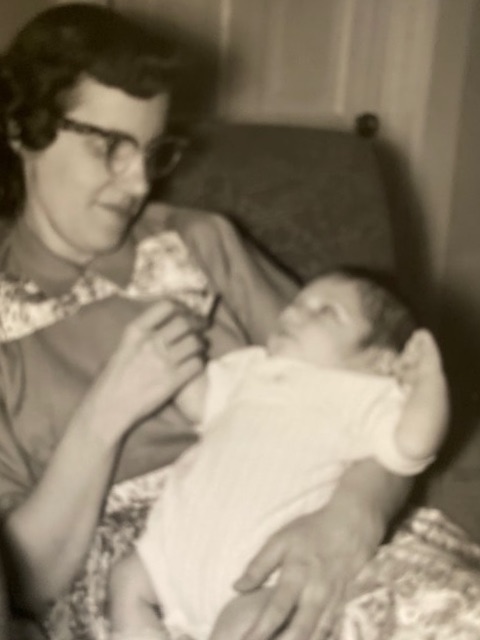
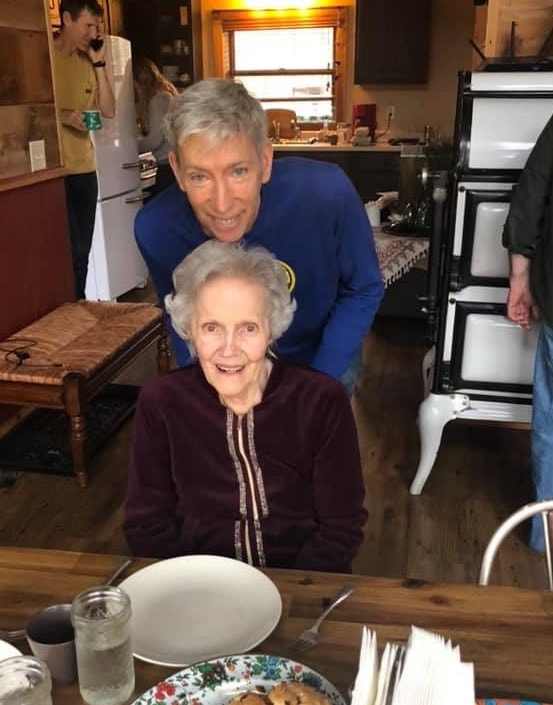

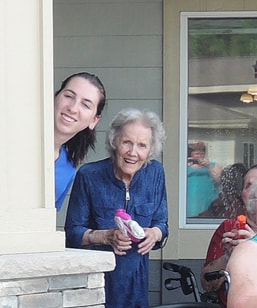
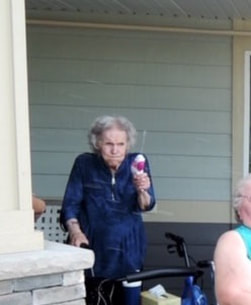
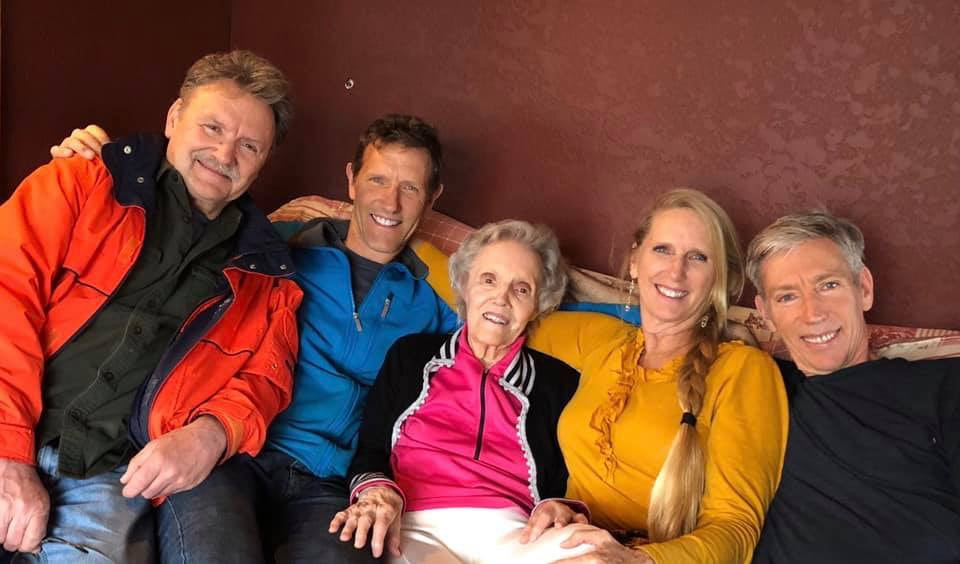
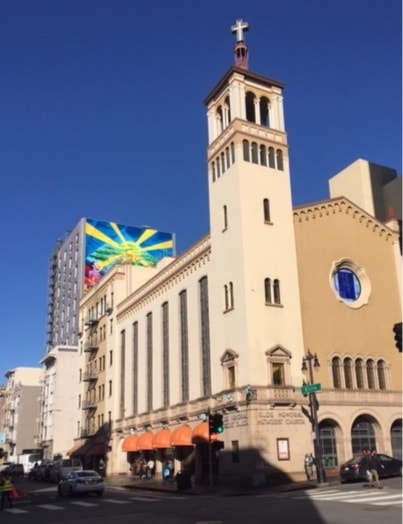
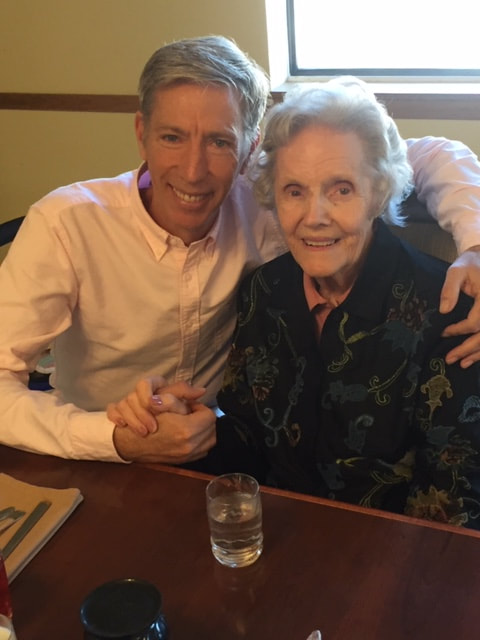
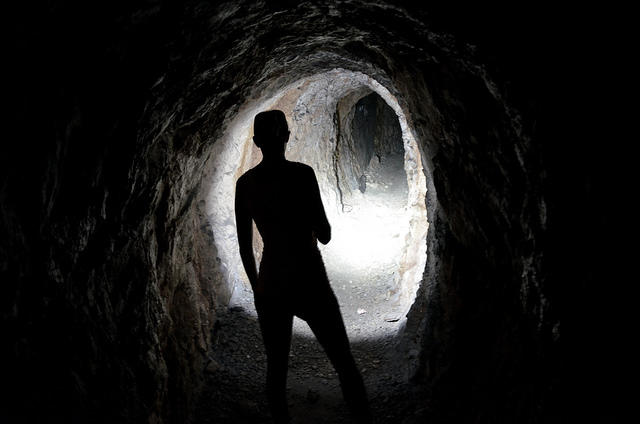
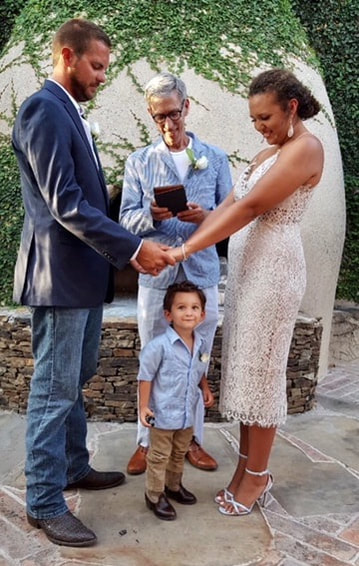
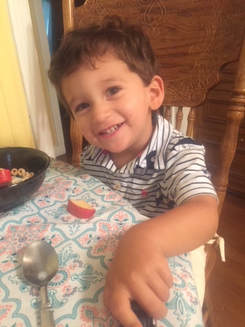
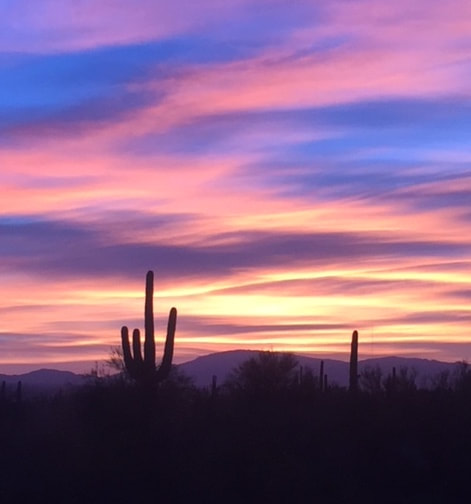
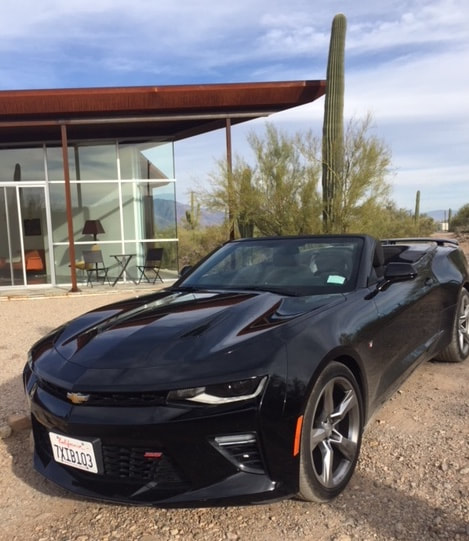
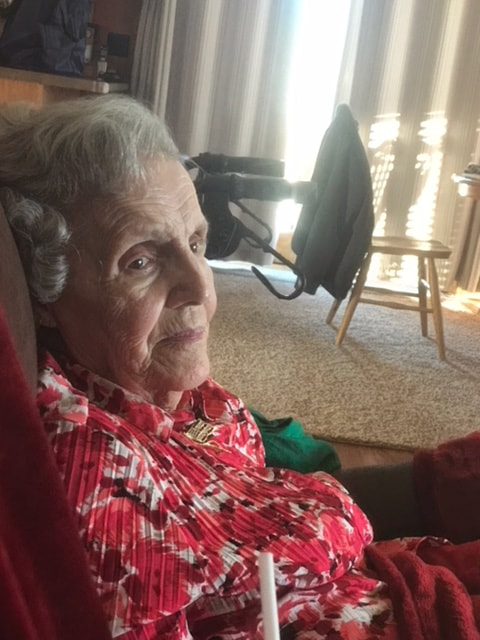

 RSS Feed
RSS Feed